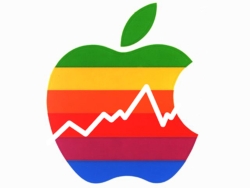Apple’s shares briefly went below $500 on worries that its days of leading the innovation cycle of mobile technology are over. This was mostly attributed to a report that Apple decreased parts orders for its iPhone 5.
The question now with the company is whether Apple CEO Tim Cook can replicate the job that Steve Jobs did three years ago when he revealed the iPad. “Investors are aware of how difficult it is for a technology company to continue to come up with products that are going to wow consumers.” says Jay Ritter, a finance professor at the University of Florida.

There hasn’t been an iPod, iPhone or iPad follow up for the company and the iPhone is reaching saturation in the U.S. The problem is that emerging markets like smartphones, but often prefer cheaper Android varieties.
There are rumors that Apple will try to enter the TV market, but studios and cable providers have proven reluctant to work with them. “We remain skeptical on Apple’s eventual foray into TVs,” said Keith Bachman of BMO Capital Markets. “We think this will be a niche market opportunity for Apple.”
Apple commands 75 percent of worldwide smartphone profits, according to analysts, but Samsung has sold over 100 million of its Galaxy S line of smartphones. Android now has 72 percent of the worldwide smartphone market, vs. 14 percent for Apple’s iOS.
“Apple’s biggest challenge is to define itself in the post-Steve-Jobs era,” says Salesforce.com CEO Marc Benioff. “Where it is struggling is when it pretends to be Steve Jobs instead of actualizing its new identity. They need to find out who they are now.”
While the smaller iPad was well received, it was a me-too move that hasn’t typified the company over the past decade. “I would hope they are working on something now. They need to keep this meteoric growth,” says Jared Ficklin, a technologist at Frog Design, a design consulting firm that worked on early Apple computers.
Shares of Apple have dropped about 29 percent since they hit an all-time high of $705.07 last year. To continue an upward trend the company will have to expand to a new market. “They fight the law of large numbers — the company will need to go to new markets [to keep growth up]”, says Edward Jones analyst Bill Kreher. “There’s a lot of concern about innovation and what Jobs brought to the table.”
“They’ve had such a fabulous run. It’s just hard to sustain such high growth once you get that big,” says Richard Sloan, a professor at the University of California at Berkeley. “Apple was sort of the king of the glamor stocks since about 2009 with increased visibility on increased sales in iPhone and iPad.”
It seems likely that Apple is switching over from a “growth” stock to a “value” one. “Hedge funds could be pulling out,” Sloan says. “I would suspect that it’s the growth-oriented investors.”
“The market is certainly valuing Apple more like Google and Microsoft,” says Ritter. “People are concerned: Is the smartphone market saturated ”
If Apple becomes a commodity maker, it could fall back on its focus on better hardware designs, home-brewed intuitive software and vibrant marketplaces for media and apps. There are rumors that they will launch a cheaper iPhone with the aluminum chassis switched with a plastic one and packing in lower-performing components.
“There’s tremendous pressure on Apple in Asia and some of these emerging markets,” says IBB Consulting analyst Jeff Wang. “There is a lot of pricing pressure that’s being created by unlocked or unsubsidized,” less-expensive phones offered locally.
“Cutting the prices of their Apple products — it’s a slippery slope into chasing a race to the bottom,” says Allen Adamson, managing director of branding firm Landor Associates. “[Apple should] start thinking of themselves as a luxury brand rather than a mass brand. The margins are much better.”

